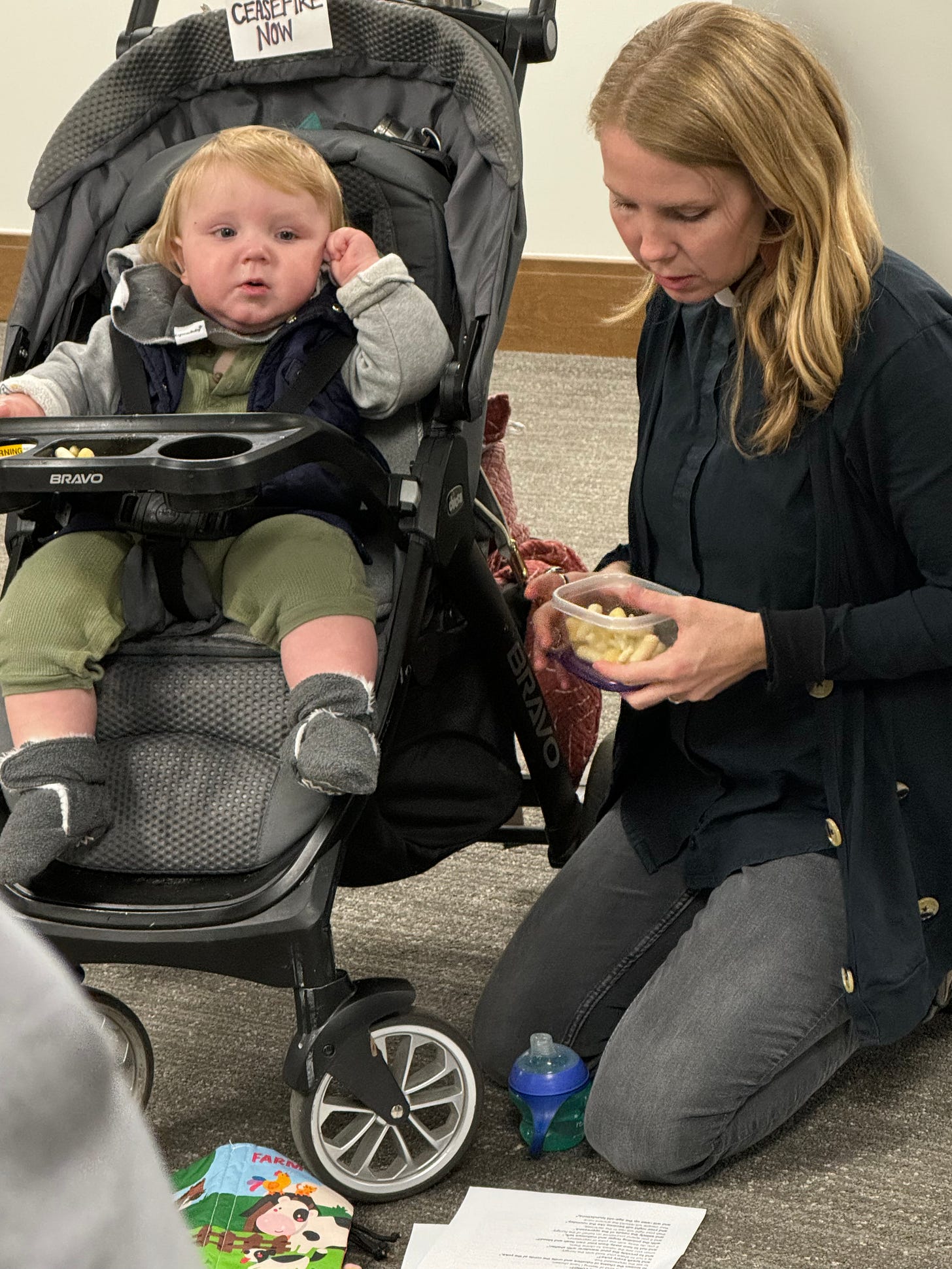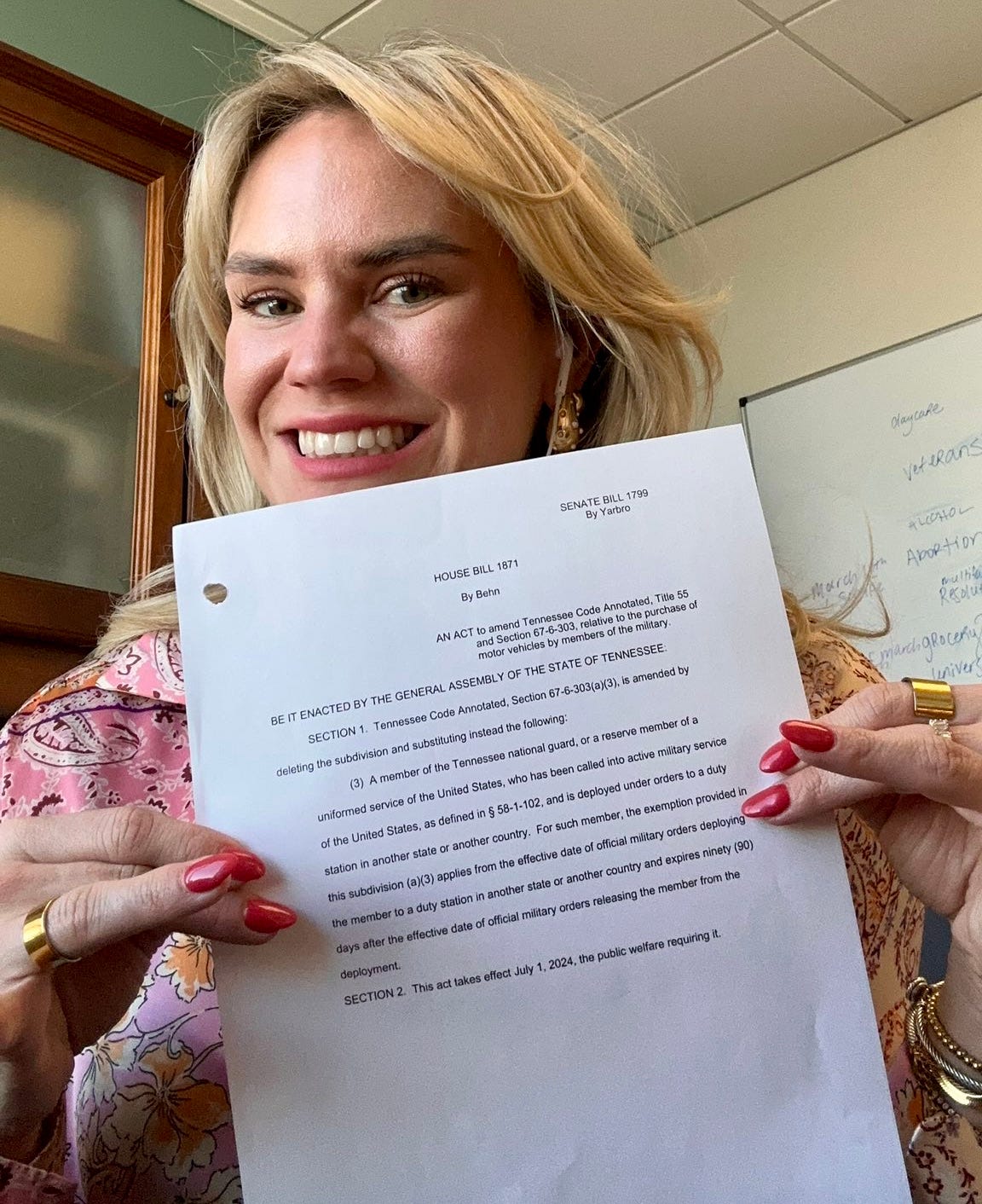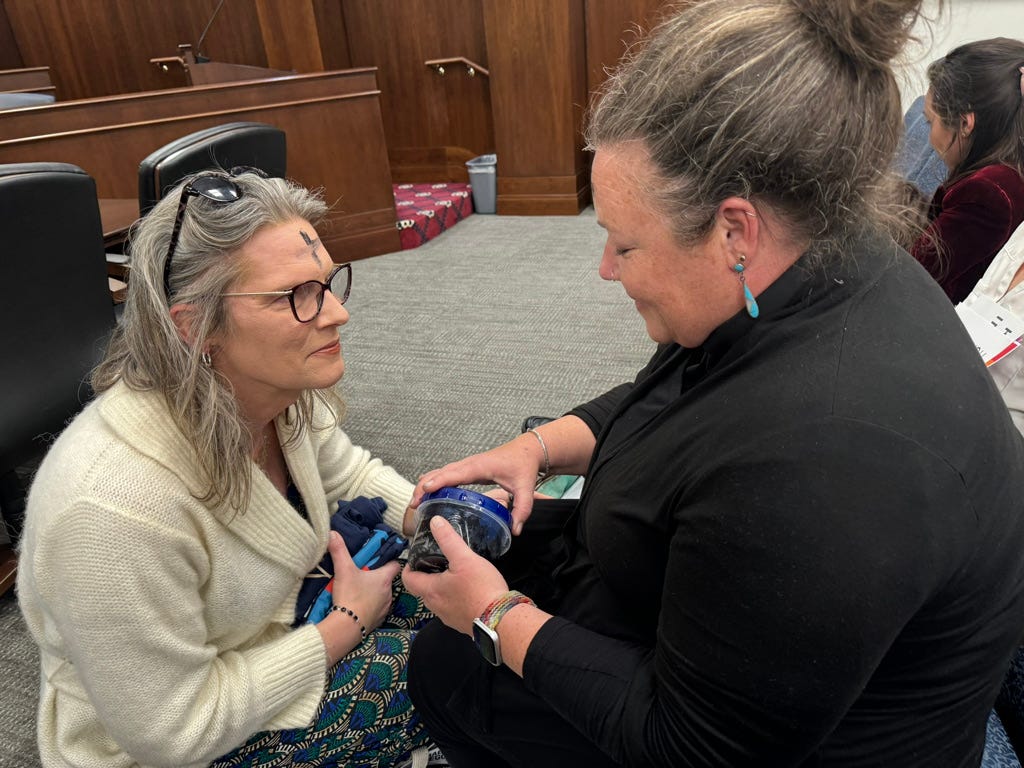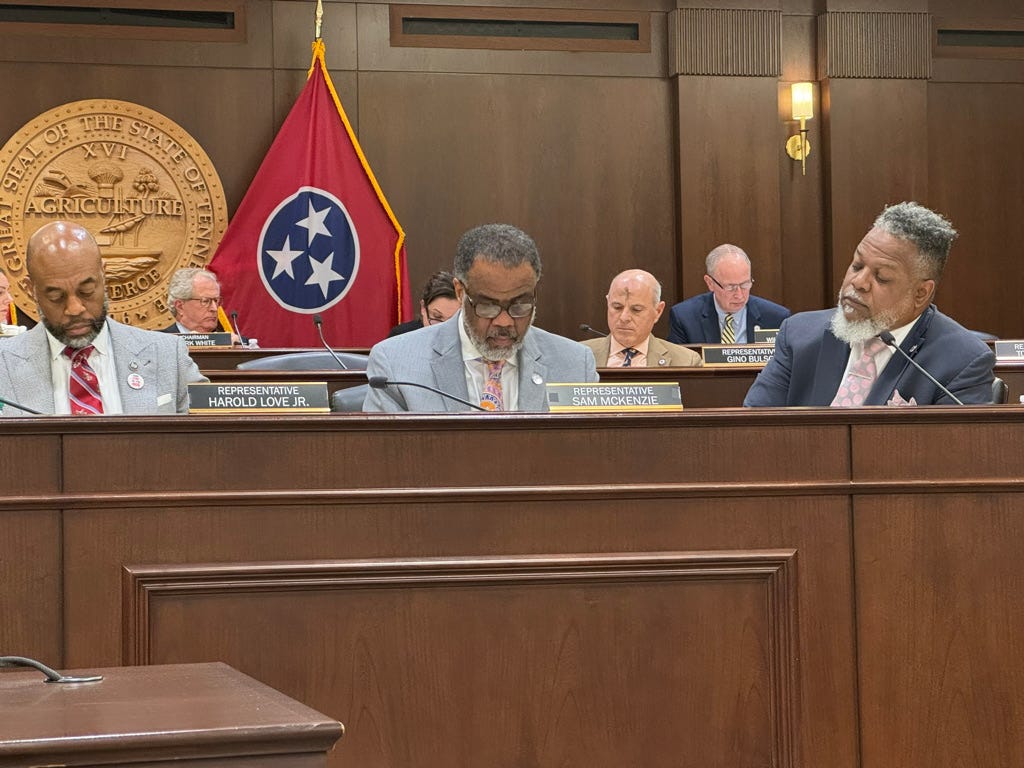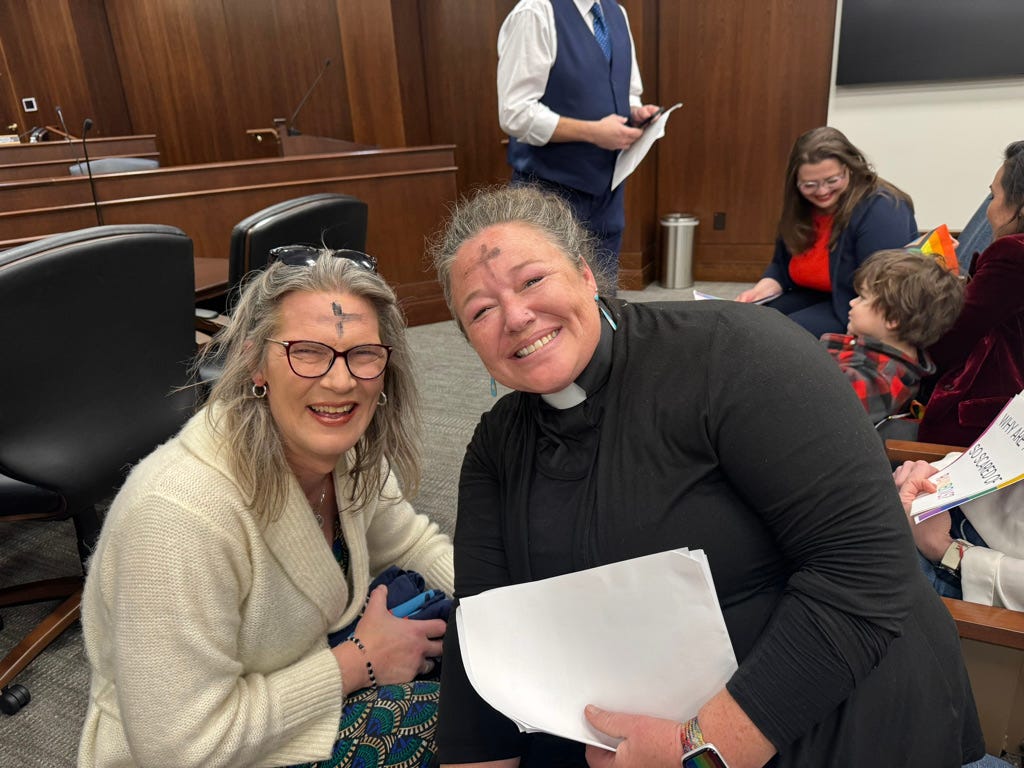Questions? Comments? Concerns? flynnconsult@gmail.com
Friends, On Valentine’s Day (Wednesday), Reverend Ingrid McIntyre and friends led a prayer vigil in Cordell Hull between the House hearing rooms to lift voices and spread ashes in honor and memory of those we are here to serve but often are not seen in person or spirit when laws are being considered at the Legislature. It was a respite and blessing for all of us.
There were many bills addressed in committees and this is a long and detailed set of Notes. Hopefully, you will not get (too) overwhelmed and at least skip ahead to the last debate about the Flag bill- and then enjoy the picture and poem-payer at the end. This is tough work- showing up, making calls, and being there for each other and our Legislative champions. Knowing that We ARE THE WORLD helps!! Michele
House Finance, Ways, and Means Subcommittee
Item 2: HB1628 by Cepicky/SB1709 by Hensley.
As introduced,
“…creates the new criminal offenses of assault within a healthcare facility and aggravated assault within a healthcare facility.”
When speaking to his bill, Representative Cepicky stated that the location for the fastest growing workplace assaults is healthcare facilities, which are up 74%.
There are several “specialized” groups for whom the increased charge of “aggravated” has been added to the more general charge of “assault,” such as for firefighters, so this bill does not stand out as objectionable.
However, it is of deep concern that healthcare workers are being aggressed against to such an extent at their place of work. May we all be kinder to our healers.
Because of the Fiscal Note* on the bill it was placed “behind the Budget**.”
DEFINITIONS:
Fiscal Note: A statement prepared by the Fiscal Review Committee indicating the estimated dollar cost or revenue impact of the bill on the State Budget.
Behind the Budget: Any legislation expected to have a fiscal impact goes “behind the budget” to ensure it does not become law without the funding to pay for it. The Finance Committee considers all legislation that may have a fiscal impact and holds legislation until the appropriations bill passes.
Item #3: HB1629 by Cepicky/SB1710 by Hensley. As introduced,
“…requires half of the unencumbered revenue from the recordation*** tax to be distributed to counties for school debt and school capital projects.”
During the Special session regarding Governor Lee’s proposed voucher program and a possible plan to refuse federal education funding, school superintendents (read Memphis) were chastised during their testimony for having extremely poor school building infrastructures that the local community had failed to address.
This bill would REDIRECT HALF OF THE FUNDS that the local government sends to the State when the property is sold BACK to the city/county to use to address school costs, including building repairs. With its passage, Representative Cepicky stated that Tennessee could have “the best schools.”
The fiscal note on this bill is $104 million. While re-allocating these funds taken from but returned to the local area might eat into the State general (rainy day?) fund, doesn’t it make sense to allow local government to retain this money for their education needs that are not otherwise being addressed because of a lack of school funding equity in the state. This is a textbook case of structural inequality: wealthier counties can rely on the collection of higher property taxes to better fund their infrastructure needs while poorer counties struggle with a smaller tax base and thus more funding challenges.
According to a 10/12/21 Tennessean article by Meghan Mangrum,
“Without a state income tax, Tennessee predominantly funds public schools through sales and property taxes.”
Given the recent pushback from both rural and urban school districts to Legislative discussions about refusing federal education funding and instituting a voucher program, both of which would undermine public education in the state, I wonder if Cepicky has felt some of the heat in his local district and thus decided to redirect some energy toward helping these school districts.
Cepicky put in a plea to have the bill brought forward for a full House vote after it is “put behind the Budget” and as expected, due to the fiscal note, the Chair did put the bill “behind the budget.”
DEFINITION:
***Recordation tax is the money collected by the county register of deeds on all transfers of real property (real estate sales) and sent to the Department of Revenue for the general fund.
Item # 4. *HB1021 by Doggett/SB1416 by Rose. As introduced,
“…increases from 30 to 60 days, after the order of a court to release money held in trust to the custodian of a minor who was a victim of a crime, the period by which the custodian must provide an accounting to the court as to how the money was spent.”
Representative Doggert talked about the changes this bill would make to the Victims Compensation Fund. Claimants are required to fully cooperate with the District Attorney’s office. There are now some exceptions included for the age of the offender and if there are psychological issues when previously the only exception was for victims of human trafficking. However, every victim still needs to “cooperate with the District Attorney.” This bill expands the documentation that can be used to prove that a crime has occurred, now includes reimbursement for mental health counseling services in case of the death of a victim for those persons who reside with the victim (now just family members) and increases the time within which the victim needs to report the crime to law enforcement, from 48 hours to 15 days.
While there is a fiscal note with this bill, Sponsor Doggett had secured a “funding letter”**** allowing this bill to be sent directly to the full Finance Committee for consideration rather than being put “behind the budget.”
DEFINITION:
****In general, a “funding letter” from the Administration recognizes the cost of a bill, states the additional funding that is needed, and includes a commitment that the cost will be covered in an Administration Amendment to the Appropriations Bill.
Item #8. *HB1871 by Behn/SB1799 by Yarbro. As introduced,
“…expands the sales tax exemption on motor vehicles sold to a member of the Tennessee National Guard or military reserve who has been called into active military service to include those who are deployed under orders to a duty station in another state or another country and not just to those deployed to a combat zone.”
Representative Aftyn Behn provided an overview of the bill.
Representative Camper thanked Behn for this bill and said that service members have been called on for a lot. She also expressed appreciation that Behn worked with Veterans committees on crafting this bill.
Behn recognized that there is a large fiscal note with this bill but asked committee members to consider it in the same manner in which they are addressing other such bills and place it “behind the budget.”
Representative Love spoke in favor of the bill.
As expected, the Chair placed Behn’s bill “behind the budget.”
On “X” Behn wrote:
“Excited to pass my first bill out of committee… subcommittee, but I’ll take it! The bill would ensure tax fairness for Tennessee service members who buy or register a vehicle in Tennessee.”
Item #9: HB1727 by Gant/SB1587 by Haile. As introduced,
“…specifies that a parent or guardian who knowingly leaves their child under the care or supervision of a person who is required to register as a sexual offender commits a Class A misdemeanor.”
No one on the Committee raised any concerns about this bill. While no child should EVER be left with a sex offender, this bill presumes that the parent or guardian would know the status of the offender and thereby shift the burden to the caregiver rather than keeping it on the offender.
How might a girlfriend, spouse, grandparent, auntie, neighbor, friend, babysitter, etc. know if a person had been placed on the Sex Offender Registry unless the State were to publish the names of those on the Sex Offender Registry in a Public Notice and preferably to provide a written notice to relatives, neighbors and unmarried parents sharing a child with an offender? But to complicate this, how many people read the newspaper today and in rural areas there may very well be no newspaper. And if the offender was on a registry in another state and moved to Tennessee without registering with the local officials no other person might know of the offender’s status.
While the bill includes the qualifier, “knowingly,” when the parent or guardian has done the right thing by reporting the assault to the authorities, and she is also coping with the child’s pain from having been sexually assaulted, she may also face being accused of knowingly exposing the child to the assault and thereby have to find the money to defend herself from an accusation of exposure to a sexual predator of which she was not aware. This also will most likely result in the child being removed from the caregiver’s home to be placed with the Department of Children’s Services (and we know how many issues there are with this Department) while an investigation of THEM is ongoing. This interruption of familial healing at a time when the child is most in need is tragic.
There are SO many complications with this bill but at its heart is another attack on women. Creating a bill that refers to what is a rare occurrence rather than the reality that it is rare for a caregiver to place their child in the hands of a known sex offender, is not just insulting of women’s integrity but it is replete with long-term injury to the child and the person who most loves them.
I also worry that this bill will provide another occasion for the law to implicate and incarcerate black- and brown-bodied mothers while the system does a slow turn toward some form of justice- once again.
It is important to note that the penalty for a Class A Misdemeanor as listed in this bill is 11 months and 29 days, and a fine of $2,500.
Because this bill has a Fiscal Note it has thankfully been placed “Behind the budget,” and hopefully will not be passed.
Item #10: HB1839 by Parkinson/SB2171 by Hensley. As introduced,
“…enacts the "Mental Health Preceptor Tax Incentive Program."
Sponsor Parkinson indicated that this bill would provide a financial incentive to institutions to hire licensed clinicians (preceptors) who act as teachers, coaches, and supervisors of nursing students who are focusing on the critical field of mental health practices during their clinical rotations. He asked the Committee to find a way to address this important need facing local communities facing shortages of such skilled caregivers.
Because of the fiscal note it was placed “behind the budget.”
Item 11: HB1864 by Faison/SB2108 by Haile. As introduced,
“…reduces the sales tax holiday price threshold for clothing from $100 to $80; increases the sales tax holiday price threshold for shoes from $100 to $150.”
Sponsor Faison “sold” the bill under the pretext that athletic shoes are very expensive but there is a need to “push students into sports,” so the clothing allowance should be reduced. Faison wants the overall maximum allowance to increase from $200 to $230 so why not just ask for that amount, parents of younger children might want more money for clothing rather than shoes, and not all children are athletes.
Sponsor Faison acknowledged that the $30 increase would lead to a large fiscal note and that it would most likely be placed “behind the budget” by the Chair, which it was.
Item 13: *HB1640 by Lamberth/SB1769 by Lundberg. As introduced,
“…expands the definition of "adjudication as a mental defective" to include a person who has been found incompetent to stand trial in a criminal proceeding and requires the clerk of court in such a proceeding to collect and report any such finding to the federal bureau of investigation-NICS Index and the department of safety; establishes a rebuttable presumption that a person who has been charged with a criminal offense and found incompetent to stand trial poses a substantial likelihood of serious harm; prohibits the purchase or possession of a firearm by a person who has been adjudicated as a mental defective.
The bill is referred to as the “Jillian Law” for Jillian Ludwick, a student at Belmont University who was murdered by a person released on bail after being charged with three counts of aggravated assault with a deadly weapon. Experts had found him to be mentally incompetent to stand trial so the judge was required to release him.
Jillian's law would require that “a person must remain committed until their competency to stand trial is restored. And "…if it isn't restored, a court must assign them a 'mandatory outpatient treatment plan.’”
Because the bill has a fiscal note, it was placed “behind the budget.”
House Elections & Campaign Finance Subcommittee
Item #1: HB1616 by Richey/SB2631 by Pody. As introduced
“…prescribes a process by which a person MUST DECLARE a statewide political party or recognized minor party affiliation before voting in a primary election; designates persons who choose not to affiliate with a political party as "Unaffiliated"; authorizes unaffiliated voters to vote in primary elections.”
Representative Richey opened the discussion about the bill by referring to it as the “Party Affiliation Bill.” Currently, no one must declare a particular party before voting but this bill puts in place a process whereby “if someone wants to be identified” as a particular party “they can go into the election office to have that changed…. and if they do nothing they remain unaffiliated.”
Richey maintained that the bill has nothing to do with setting up a “closed primary” and voters “CAN CHOOSE to be affiliated with a particular party” if that is what they want.
But when Richey was questioned by Representative John Crawford as to “what about the SHALL aspect of the bill” Richey told Crawford that everyone who is a current voter would be listed as “unaffiliated” and then would have to go to the election office to declare one party or remain “unaffiliated.” When a new voter registers, they SHALL have to declare themselves to be a Democrat, Republican, or unaffiliated. If someone wants to change their party affiliation after their initial designation they would have to go to the Election office to do so.
After Richey’s response, Crawford commented, “I understand what he’s saying there, but it still sounds like it’s a mandate to me.”
Shannon Rasmussen provided testimony as to why this bill is “injurious to the people.” She said it limits “the rights of the people” and urged the Representatives to “protect our constitutional right to vote by opposing HB1616.”
Debbie Gould, Director of the League of Women Voters also testified in opposition to the bill, saying it would “change Tennessee to a closed primary state.”
“…election laws need to be voter-centric, making it easier for voters to select representatives of their choice. Closed primaries move this process in the wrong direction and have the potential to further reduce Tennessee’s very abysmal voter participation rate.”
Representative Crawford reminded Committee members that “Tennessee is the easiest state to vote in but the hardest state to cheat in.” Crawford sought clarification on the process for someone who was registered in one election with one party but later wanted to change party affiliation for the next election. He also expressed concern about the effect of this bill on voter turnout.
Representative Larry J. Miller expressed concerns about the “unintended consequences” of this legislation. “It’s almost as if you are trying to suppress the vote, to keep people from wanting to vote. We’ve got to be very careful about this.”
Crawford followed up with, “I am contending that the word ‘Must’ makes it mandatory; that you would have to choose one or the other. It’s not a choice.”
Every Subcommittee member voted FOR the bill EXCEPT Representative Larry J. Miller.
HB1616 is now scheduled to be heard in the Local Government Committee on 2/20/2024. Representative Crawford is the chair of this committee. It would be great if more folks would sign up to testify before this committee!!
Item #2: *HB2185 by Hemmer/SB2057 by Yarbro. As introduced,
“…requires political advertisements that are created in whole or in part by artificial intelligence to include certain disclaimers; requires materially deceptive media disseminated for purposes of a political campaign to include certain disclaimers; establishes criminal penalties and the right to injunctive relief for violations.”
Representative Hemmer asked that his bill be rolled for one week because he wants to bring expert testimony but he also asked permission to make a few comments about the bill.
Hemmer indicated that AI is a complicated emerging technology. He is concerned about the unethical use of AI particularly as it relates to elections. He noted that the state of Washington has passed a similar bill this year. He mentioned that this summer, when Governor Ron DeSantis was running for President, he created a false image of Trump, which created a lot of discussion about ethics and the use of AI technology. He went on to say that five other states currently have similar technology and that 25 are currently looking to create a similar law. Even the FTC is exploring how to prevent the irresponsible use of AI to make robocalls that use the replicated voice of a candidate to make false statements attributed to them. Media companies would be exempt from liability under the amendment attached to the bill. Hemmer encouraged the members of the committee to look at the AI-generated post he sent to all of them.
The Chair agreed to roll the bill for one week.
Item #3: HB2080 by Wright/SB1968 by Briggs.
This is the “ Stop Gloria Johnson from running against Senator Marsha Blackburn unless she resignes from her TN House seat first” bill. But of course, Sponsor Wright and numerous Republican Legislators keep saying this bill has nothing to do with Gloria. Yet, even her election opponent for the US Senate seat came to testify on Johnson’s behalf (see below).
As introduced, HB2080
“… prohibits an individual holding an elected office of a local government from holding another elected office in this state at the same time; expands the prohibition on a candidate qualifying or being nominated for more than one state office or county constitutional office to include any elected office in this state.”
Wright maintained that the bill “…is a couple of years in the making” and “…is the result of a specific incident in which a person had petitioned to be elected Mayor and Alderman where the elected person… would have had 2 votes on the Board.”
Pamela Moses, Candidate for the US Senate seat currently held by Marsha Blackburn, the same one that Representative Gloria Johnson is running for, came to testify AGAINST the bill. “Its intent is flawed, arbitrary, and capricious. It seeks to disadvantage State Representative Johnson from pursuing the position of United States Senator, a position that I, too, am seeking.” She concluded her statement with, “Without a true democracy we have anarchy.”
In response to questions, Wright could not say when the bill would take effect although another committee member clarified that it would take effect as soon as the Governor signed it, which could be shortly after the session ended in May and well in advance of the Senatorial election in November.
Representative Miller asked, “Once someone files for a petition they could not pick up one for state representative and one for US senate? Can they do that? After a bit of rambling (listen below) Wright said that while that has happened in the past, “…with this legislation the answer is, ‘No.’”
When asked by Miller whether the bill would apply going forward, to a future case, or would it be retroactive, as in effecting Representative Johnson? Wright said he could not say when it would apply. “I cannot answer that question.”
Legal Council waded into the discussion, but only to muddy the water.
Representative Jeff Burkhart asked if it would be okay with Wright to roll the bill for one week to address some of the committee questions and obtain more clarification. Instead, Wright said that he would answer any of their questions and amend the bill accordingly but asked that the bill be moved on to the full Local Government Committee, and if “something came up there” he’d be happy to return to this committee.
Believe it or not (yes, of course, it is the Tennessee super majority body, so guess what they did?), the only person on the committee who objected to its passage as is was Miller. The Chair sent the bill on to the Local Government Committee, commenting “…with your guarantees on the bill” to Wright.
The bill will next be heard at 1:30 PM on 2/20/2024 in Hearing Room #1.
Education Instruction Subcommittee
Item #1: HB2882 by Todd/SB2923 by Bailey. As introduced,
“…requires, beginning with the 2025-2026 school year, each local education agency and public charter school to provide students with age-appropriate and grade-appropriate instruction on firearm safety.
Representative Todd told the Committee that the bill merely amends the SAVE Act (Schools Against Violence in Education) to allow for firearm safety training. The SAVE Act already requires annual safety training for students, teachers, and personnel related to fire, tornado, and other occurrences. This bill would add a “firearm safety curriculum” and give students credit toward their required SAVE credits.
Representative Johnson stated that firearm safety has not been required up until now but this bill would REQUIRE firearm safety training. Sponsor Todd agreed, saying “Kids are going to see firearms, either in school or at home” and this just allows them to have basic gun training (!).
Johnson then asked, “Is there parental permission required? If parents don’t want their child to receive the training, can they opt out?
Todd said “No” and suggested that this training was just like what students received for fire or tornado safety.
Johnson said there is nothing neutral about gun violence. Gun violence is bad. I can’t support anything that says we are going to be neutral. Is there good and bad sides to gun violence? I don’t understand being neutral on gun violence. To me, that’s nothing but negative.
Todd responded, “We don’t want anything politicized… Just straight facts.”
He went on to say, “Near 100% of kids before they’re 18 will come across a firearm at home or school. This is something they are encountering, much more than a fire, so we need to spend more on this and less on fire training… If it starts in 3rd grade or 2nd grade or 5th grade… It will drive the point home of what to do when they see a firearm.”
The bill passed and was sent to the full Education Instruction Committee scheduled for 9:00 AM on Tuesday, 2/20/24.
I have a series of questions just off the top of my head:
What about all the children in Tennessee committing suicide? We have the highest number in the country of teenagers who actually carry out the threat. It’s not surprising since they have such ready access to guns.
What about kids engaged in mass shootings? Do we want kids to develop a higher comfort level with guns, beginning in 2nd grade?
How does this training make any of our children safer?
Is this merely a recruiting tool for new lifetime members of the NRA since their memberships have been declining? NRA revenue is in freefall as member dues plummet according to an October 26, 2023 article by Robert Maguire published by the organization CREW.
House Education Administration Committee
Item #2: HB1697 by Stevens/SB1663 by White. As introduced,
“…removes the requirement that LEAs administer a pretest to students participating in an after-school learning mini-camp, learning loss bridge camp, or summer learning camp; deletes various reporting, funding, and accountability provisions regarding such pretests.”
After Sponsor Stevens read the bill caption above, Representative McKenzie spoke about the need for testing to see how students may have improved from the beginning to the end of the summer and said, “…data is a good thing.”
When Stevens referenced the data that had been collected from the first and only year of the program operation, McKenzie opined that “… it’s a mistake to pass a bill saying we have (enough) info after just one year.”
Representative Love waded in to ask if the Amendment that was removed could have stayed on the bill, would the K-2 aged children have had a pre-test and post-test to see their scores before they enter the 3rd grade, where the issue comes up as to whether the children might be held back.
Chair White asked if the committee might feel better if the Amendment was placed back on the bill so the data could be collected for these children.
Representative Todd Warner followed up immediately with a question to sponsor Stevens, asking whether he had worked with the Department of Education to craft the bill. Stevens answered Yes and added that they had said the bill would be more complicated if an Amendment was added.
At that point, the question was called and the bill passed by majority vote. It was difficult to hear whether both McKenzie and Love voted against the bill as written, without the Amendment but I presume they did.
The bill moved to the Finance, Ways, and Means Subcommittee to be heard at 8:00 AM on Wednesday 2/21/2024.
Item #4: HB1631 by Bulso/SB1708 by Hensley. As introduced,
“…clarifies that a private school serving students in any of the grades pre-K through 12 is authorized to adopt a handgun carry policy for the private school's property.
Representative Love asked, for clarity, whether each public school, Pre-K through 12th, can craft its own firearm policy. Representative Bulso answered they do not.
The point of this bill is to allow each private school to craft its individual handgun policy.
The Bill passed with just Love voting No. The bill was referred on to the Calendar & Rules Committee with a recommendation for passage.
Item #5: HB1605 by Bulso/SB1722 by Hensley. As introduced,
“…prohibits LEAs and public charter schools from displaying in public schools flags other than the official United States flag and the official Tennessee state flag.”
There was a lot of back and forth about this bill introduced by Bulso in the House.
In his introduction, Bulso stated that it is a parent's right to determine what values their children will learn.
Representative Love asked Bulso a series of questions:
Would a university flag be allowed? Bulso answered yes because university flags were added.
Would a TSU Band flag be allowed? Bulso said yes because it fell under the definition of a university flag.
Would the TN General Assembly flag be allowed to be displayed? Bulso answered that the bill could be read to include this flag. When Love suggested that the General Assembly was not a part of a local government so it did not fit in the language, Bulso countered that because the Tennessee flag is allowed and the General Assembly is part of Tennessee state government then this flag would be allowed.
Legal was asked for clarification and she said provided the statement that because “political subdivision” is not defined in the bill then it would be a matter of interpretation as to whether the General Assembly flag could count as a political subdivision.
Love addressed the issue that since a parent could bring a civil action under this bill it is important to have clarity because it is serious and needs to line out precisely what is and is not allowed.
During a break, while the legislators talked among themselves about how they were going to handle the questions posed by Love, Pastor Ingrid McIntyre placed the sign of the cross on Chaplain Daryn Johson, a moment of love in a sea of turmoil on this Valentine’s Day. It did not go unnoticed by anyone that Bulso had also taken ashes that morning.
Please take a moment to pause and click on this link“We shall not be moved” sung by Mavis Staples.
When the legislators returned from their break (during which they mostly ignored Bulso and talked among themselves) there was a request for a roll call vote so they would have to be on the record with their vote on the flag bill.
Three individuals had signed up to testify in opposition to Bulso’s bill so the committee went out of session to hear them.
Erica Bolton went first…
…followed by Lauren Shipman Dorrance (spell?)
…and ending with Macey Fluhearty (spell?)
Coming back into session, McKenzie took over questioning of Bulso as to specifically what flags could be flown- did it include the confederate flag?
Bulso responded that whatever is currently prevented from being flown under existing law would continue to be excluded under this bill.
McKenzie then asked Legal if it is true that a flag representing a country or a political subdivision that exists today could be flown, for example, a confederate flag or a 48-US flag. Legal gave a very unclear answer.
McKenzie then asked, “Could the nazi flag be included in this discussion because it was a historic conflict.”
Legal asked McKenzie to repeat his question. He did, offering citations (and verse).
After some back and forth, Legal said she was not able to answer a fact-based question and that would be a matter for the courts if a suit was filed. When Representative Parkinson pressed her for an answer, Legal said she would be willing to do some research on the question.
Parkinson then asked Legal to read the list of those flags that could be flown. After she finished, he pointed out that this meant that the Nazi flag could be flown.
I want to once again display the following visual of three Democratic African American legislators sitting on an education committee where there are NO women and they are the only ones who stand between those of us in the audience and the white Republican male legislators who fail to say even one word to decry the possibility that a Nazi or Confederate flag might possibly be displayed on school grounds in Tennessee while the Pride flag and Black Lives Matter flags will be banned by this bill.
The roll call vote was 12 Yes and 4 No. Unsurprisingly, Love, McKenzie, and Parkinson voted No, but we were curious that Republican Representative John Gillespie had shifted to a No vote as well. Was this because of the conversation during the committee meeting or previous to it? Maybe by a constituent? This is why it is so important to keep talking to these folks, as hard as it might be.
The Bill moves on to the Calendar & Rules Committee
Even in the face of such obvious bigotry, Chaplain Dahron Johnson and Pastor Ingrid McIntyre were able to share a moment of joy and Ingrid offered the following prayer-poem for all of us.





